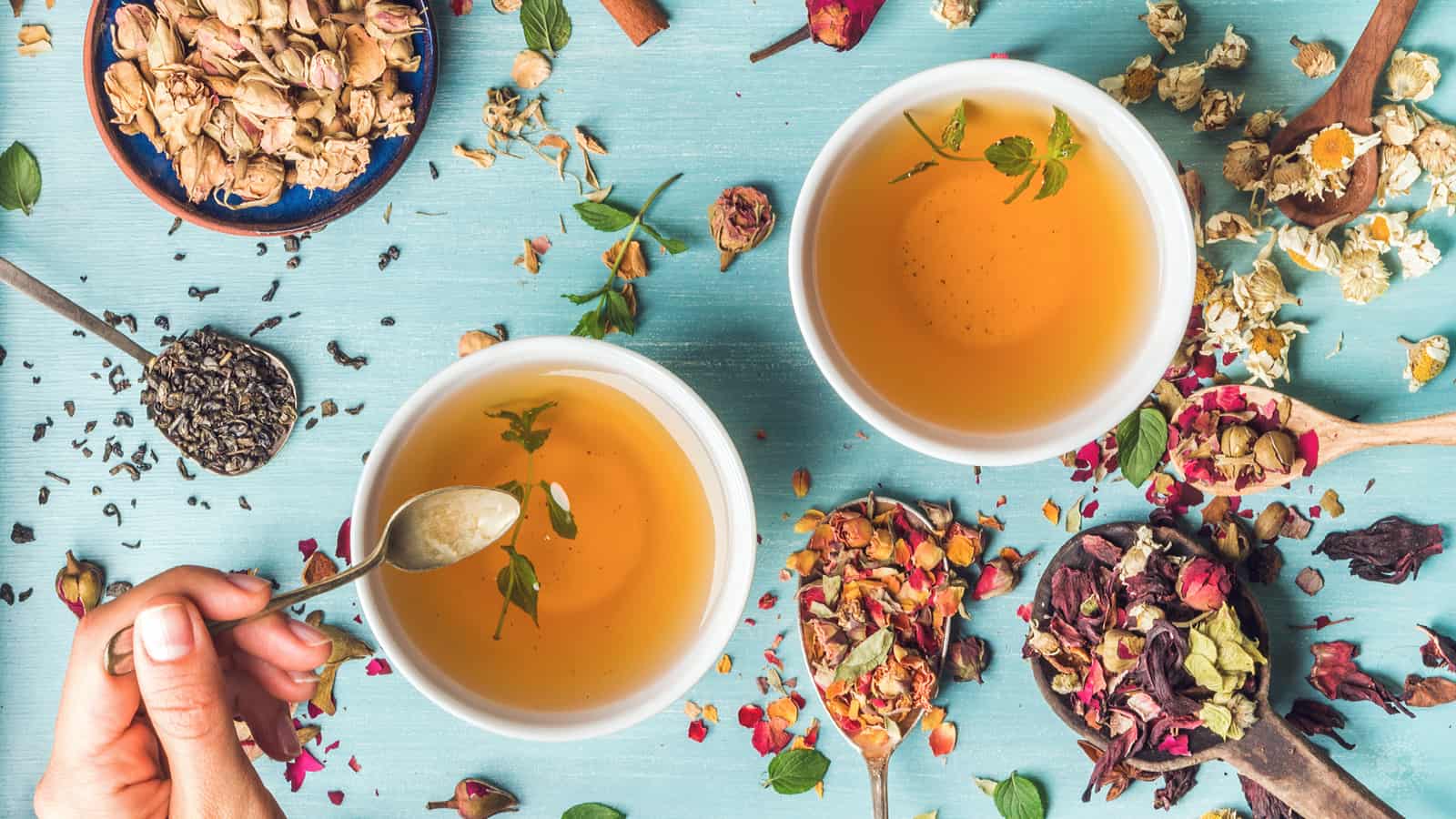Before modern times, people couldn’t run to their local urgent care facility, see a doctor, and get a prescription for their ailments. They depended on Mother Nature’s lush pharmacy of plants, herbs, seeds, and roots.
Through study, trial, and error, cultures around the world discovered herbal remedies that became the predecessors of many of our modern medicines.
Nature’s Infection Fighters
Contents
Before scientists even discovered the germs and viruses that cause infections, people often used herbs to combat them, often successfully. They ingested them whole, ground, or infused in steaming teas. Modern scientific data indicates that many herbs can benefit your body and fight infection naturally.
Have a Cup of Tea
If you enjoy a warm, fragrant beverage without caffeine, herbs have you covered. You can purchase herbal teas loose-leaf or in tea bags. Have a steamy cup in the morning, or to help you rest at night. For a cool, refreshing alternative to soda, prepare a pitcher of iced herbal teas in your favorite.
The Perfect Way to Brew Herbal Teas
For brewing the ideal cup of herbal tea, heat purified water in a tea kettle until it comes to a rolling boil. Put your loose-leaf teas in a tea strainer or use a ready-made tea bag in your teacup.
Pour the water in your cup, allow the tea too steep for 3-5 minutes, and remove the filter or tea bag. While most herbal teas are delicious on their own, feel free to add a bit of organic sugar, honey, or lemon to taste.
You may consider doing some experimenting with loose-leaf teas to find a combination that fits your palate.
Use Caution Mixing Herbs and Prescription Medications
Just because an herb is entirely organic and natural doesn’t mean it can’t have side effects. Some herbs can interact negatively with certain medications and can create a dangerous situation. Before drinking herbal teas, talk to your doctor about any health issues you have, your medications, and if you are pregnant or nursing.
What are the Best Herbal Teas for You?
Since many herbal teas are high in antioxidants and vitamins, you have many choices. Some herbs have delicate, floral aromas and tastes while others have more spicy, woodsy nuances.
Here are some of the top teas that can fight viral infections and give you a better sense of well-being.
1. Ginseng
Of the many legendary herbs and roots with historical medicinal value, ginseng is among the top. Historians believe that this admired root was discovered and cultivated thousands of years ago in China, where it remains an integral part of Chinese medicine.
Its Latin name Panax describes the benefits as an herb for just about everything. The root is often ground into a fine powder and blended into a delicious, earthy tea that was once the elixir of ancient Chinese emperors. Studies have shown that Panax may boost energy, improve your mood, or increase sexual energy in men and women.
2. Dandelion
Do you spend the better part of spring trying to rid your lawn of dandelions popping up everywhere? When French explorers in North American observed the abundant yellow flower, its leaves reminded them of dent de lion, or the tooth of a lion, from which we get our word.
Did you know that this has been a revered herb for centuries? Its roots are often ground to make an aromatic brew that is loaded with antioxidants, and Vitamin A. Scientific reports suggest that this member of the daisy family can be a mild diuretic, liver cleanser, anti-inflammatory, and cholesterol reducer.
3. Chamomile
Remember when your grandmother swore by chamomile tea to soothe frazzled nerves? It looks like Grandma was in good historical company. Ancient Egyptians picked the delicate daisy-like blooms, dried them, and steeped them in water for a beverage to combat the common cold.
This classic herb has a devoted following in other ancient societies such as Greece and Rome. Not only can this herbal blend help your cold symptoms, but it may also induce a relaxing sleep, soothe indigestion, ease menstrual cramps, level blood sugars, and possibly prevent certain cancers.
4. Rosemary
Who would have thought that the zesty herb so prevalent in Italian cuisines would make a delightfully healthy tea? Rosemary is a perennial shrub native to lands surrounding the Mediterranean.
It was a familiar herb to Ancient Egyptians who used it for food, medicinal, and burial purposes. This woody-stemmed shrub has small fragrant needles like pine trees, and it lends strong floral tastes to meats and vegetables.
When steeped as a tea, it may improve your memory and lift your moods. Multiple studies suggest that this tea may benefit your vision, reduce inflammation, support brain health, and encourage strong and healthy hair.
5. Licorice Root
Remember the peppery sweetness of black jellybeans and licorice twists you enjoyed as a child? Licorice root has a long history embedded in Ancient Chinese medicine. It was developed in Medieval monasteries as a valuable culinary and medicinal herb.
You are probably familiar with licorice’s unmistakable flavor nuances in everything from candy, desserts, and dental hygiene products. Licorice tea has a crisp, refreshing flavor that can soothe heartburn and indigestion. Since it has natural anti-inflammatory properties, it may encourage good dental health and may help heal peptic ulcers.
6. Lemon Balm
No herb garden would be complete without a few bushes of lemon balm. It has a lovely citrusy scent with subtle flavors of mint and lemon. It is native to Africa, parts of Europe, and Asia and is a member of the mint family.
Just a small start can quickly spread throughout your garden, so many people opt to grow it in containers. A tea rich with this lemony flavor has been used for generations to calm anxiety and soothe irritated nerves. Some reports indicate positive benefits for improving mood and memory and easing menstrual cramps.
7. Fennel
Do you know that sweet and zesty licorice-like flavor you often taste in sausage and Italian tomato sauces? It comes from fennel, a bulbous vegetable that is in the carrot family.
The bulb grows on the surface of the ground and sprouts gracefully like dill weed. All parts of the vegetable are edible, including the green leaves and its seeds. This veggie has a wealth of dietary fiber, vitamins, minerals, and antioxidants that protect your cells from free radicals.
Infuse the seeds as an herbal tea to help indigestion, breathing problems, constipation, or regulating your blood pressure.
8. Elderberry
This humble purple berry has garnered a lot of attention in the world of alternative medicine. Elderberries are native to eastern North America and have been used for thousands of years by indigenous peoples as a food, beverage, pharmaceutical, and a natural dye.
The primary benefit of drinking elderberry in tea form is how it can soothe cough and congestions from colds and other respiratory issues. Since these fruits are a significant source of Vitamin C, it can support your immune system and ease inflammatory problems in your body.
9. Peppermint
Merely a whiff or taste of this iconic mint probably makes you think of holiday candy canes and swirled disk candies. Since ancient times, peppermint was valued for its cooling, calming effect on the digestive tract. Its minty freshness is the darling of pastries and is a ubiquitous flavoring agent for medicines and dental hygiene products.
Herbal teas made with this mint can help reduce heartburn and upset stomachs. It’s also suitable for soothing a sore throat and hacking cough. It is a natural anti-inflammatory that can ease stuffy sinuses and help you rest better.
10. Echinacea
If you talk to trained and experienced herbalists about alternative medicine for respiratory problems, they will recommend purple coneflower, scientifically named echinacea. These lovely daisy-like flowers are prominent across the prairies of North America.
Native Americans recognized this herb as a vital medicine and often prepared it in herbal teas for colds, sore throats, earaches, toothaches, and body aches.
11. Ginger
Since the earliest annals of many Asian cultures, ginger has played a pivotal role in food, beverages, and medicinal treatments. It is a thick, woody root that can be used raw, cooked, or infused in teas.
It is often ground into a powder for tempting desserts, such as the eponymous holiday shortbread. This blend of tea has an intoxicating aroma and has been used for thousands of years for digestive and liver issues.
It can be helpful to ease nausea, diarrhea, and cramps. Some medical evidence suggests that this herb can lower your blood pressure and regulate your blood glucose level.
Final Thoughts on Enjoying Herbal Teas for Better Health
Herbal teas are a delicious way to relax and benefit your health. Consult your professional healthcare provider about which supplements and herbal may be right for you. Whether you like it hot or cold, teas may help you fight viral infections and keep you and your family healthy.
Source: 11 Herbal Teas That Fight Viral Infections- powerofpositivity.com

